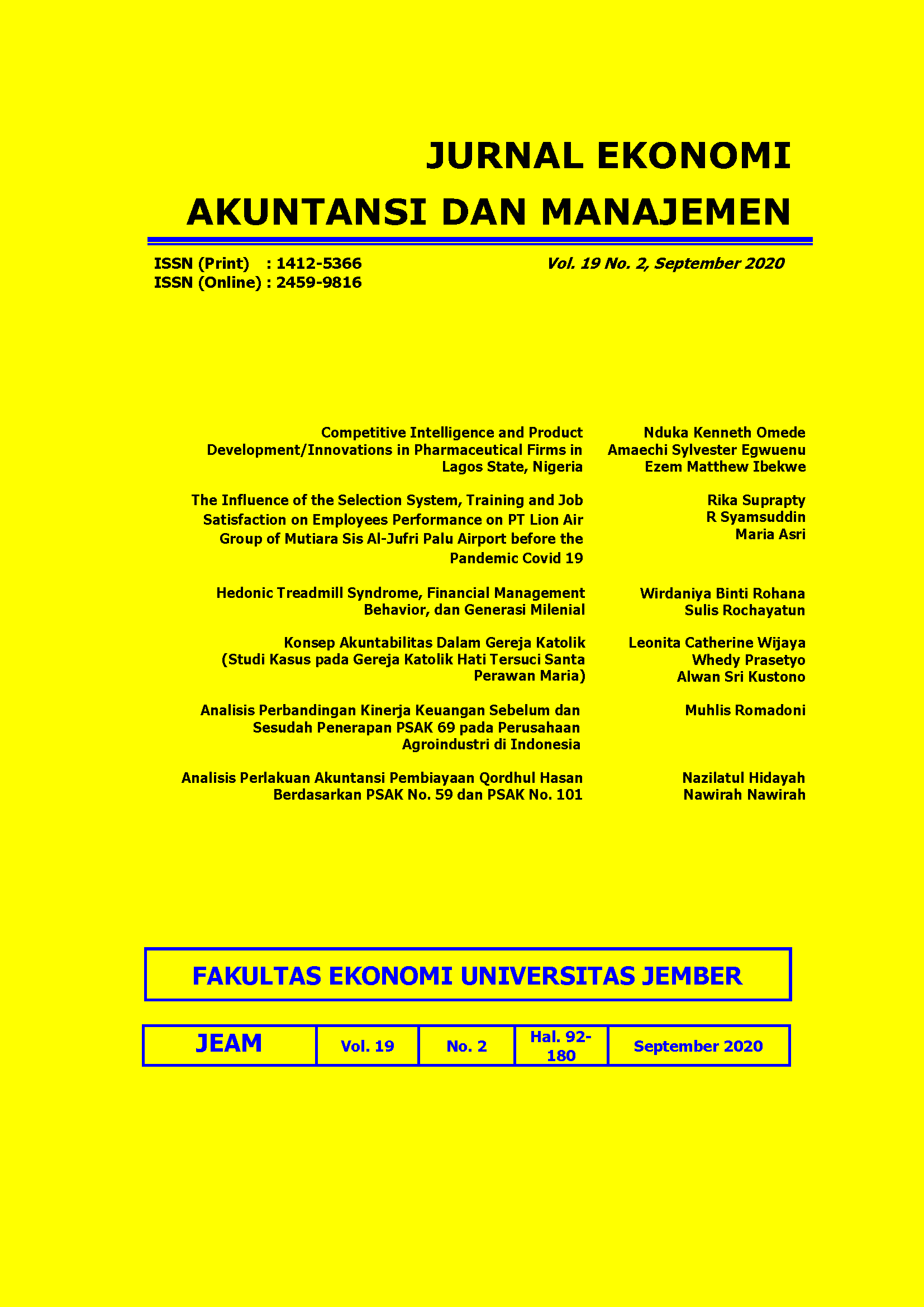Hedonic Treadmill Syndrome, Financial Management Behavior, dan Generasi Milenial
Abstract
The students consumptive behavior is the impact of increased consumption and economic growth. The continued impact of consumptive behavior is hedonism. Every student needs a tool called money to make ends meet as a student and his daily needs. However, the desire and dissatisfaction of students with what they already have can cause financial problems to arise, so that every student needs an increase in financial management behavior. Descriptive qualitative method with an interpretive approach is used in this research.
This reserach aim to find out the students' hedonic treadmill syndrome and how to implement the concept of their financial management behavior considering the many cafes around UIN Malang. This study concluded that the environment affects students' hedonic treadmill syndrome. The meaning of the concept of financial management behavior by Accounting students of UIN Malang as a form of responsibility because their parents have entrusted them with pocket money. Thus, students feel they must be able to manage these funds, take them into account, distribute them properly, and use them logically.
Keywords: Hedonic Treadmill Sundrome, Financial Management Behavior, University Student
References
Arifin, A. H. 2019. Hedonic Treadmill Syndrome Terhadap Penggunaan Financial Technology Pada Generasi Millennial 2019 [cited 1 September 2019]. Available from https://www.academia.edu/36319478/Hedonic_Treadmill_Syndrome_pada_Penggunaan_Fintech_di_Generasi_Millenial_.pdf
Budiati, I., Susianto, Y., Adi, W. P., Ayuni, S., Reagan, H. A., Larasaty, P., Setiyawati. N., Pratiwi. A. I., Saputra. V. G. 2018. Profil Generasi Milenial Indonesia. Jakarta: Kementerian Pemberdayaan Perempuan dan Perlindungan Anak.
Carlson, E. 2008. The Lucky Few: Between the Greatest Generation and The Baby Boom. USA: Springer.
Dew, J., dan X. J. Jian. 2011. The Financial Management Behaviour Scale: Development and Validation. Journal of Financial Counseling and Planning 22:43-59.
Ernams. 2019. Pendekatan Interpretif 2008 [cited 20 November 2019]. Available from https://ernams.wordpress.com/2008/01/07/pendekatan-interpretif/.
Furham, A. 1984. Many Sides of The Coin: The Psychology of Money Usage. Personal and Individual Difference 5 (5):501-509.
Hadinata, H. 2019. Hedonic Treadmill dan Perencanaan Keuangan 2016 [cited 19 November 2019]. Available from https://personalfinance.kontan.co.id/news/hedonic-treadmill-dan-perencanaan-keuangan.
Herawati, N. T., I. M. Candiasa, I. K. Yadnyana, dan N. Suharsono. 2018. Factors That Influence Financial Behavior Among Accounting Students in Bali. International Journal of Business Administration 9 (3):30-38.
Humaira, I., dan E. M. Sagor. 2018. Pengaruh Pengetahuan Keuangan, Sikap Keuangan dan Kepribadian terhadao Perilaku Manajemen Keuangan pada Pelaku UMKM Sentra Kerajinan Batik Kabupaten Bantul. Jurnal Nomina 7 (1):96-110.
Ida, I., dan C. Y. Dwinta. 2010. Pengaruh Locus Of Control, Financial Knowledge, Income Terhadap Financial Management Behavior. Jurnal Bisnis dan Akuntansi 12 (3):131-144.
Kementerian Riset, T. d. P. T. 2020. Pangkalan Data Pendidikan Tinggi 2020 [cited 6 Februari 2020]. Available from https://forlap.ristekdikti.go.id/perguruantinggi.
Kholilah, N. A., dan R. Iramani. 2013. Studi Financial Management Behavior Pada Masyarakat Surabaya. Journal of Business Banking 3 (1):69-80.
Malang, M. 2019. Menilik Fenomena Menjamurnya Bisnis Kafe di Kota Malang 2019 [cited 19 November 2019]. Available from http://mocomalang.id/2019/06/20/menilik-fenomena-menjamurnya-bisnis-kafe-di-kota-malang/.
Marsh, B. 2006. Examining The Personal Financial Attitudes Behavior and Knowledge Levels of First-Year and Senior Students at Baptist Universities in teh State of Texas. Bowling Green State University.
Mufidah, E. F., dan P. S. D. Wulansari. 2018. Gaya Hidup Hedonisme Mahasiswa Pascasarjana di Media Sosial. Jurnal Konseling Indonesia 3 (2):33-36.
Nababan, D., dan I. Sadalia. 2013. Analisis Personal Financial Literacy dan Financial Behavior Mahasiswa Strata I Fakultas Ekonomi Universitas Sumatera Utara. Media Informasi Manajemen 01 (1):1-16.
Prabowo, S. L. 2020. Cita-cita Besar Kami Adalah Menuju World Class University (8) 2014 [cited 6 Februari 2020]. Available from https://www.uin-malang.ac.id/r/140401/cita-cita-besar-kami-adalah-menuju-world-class-university-8.html.
Purwidianti, W., dan R. Mudjiyanti. 2016. Analisis Pengaruh Pengalaman Keuangan Dan Tingkat Pendapatan Terhadap Perilaku Keuangan Keluarga Di Kecamatan Purwokerto Timur. Benefit: Jurnal Manajemen Dan Bisnis 1 (2):141-148.
Ratnasari, D. 2018. Pengaruh Locus Of Control, Financial Attitude, Dan Parental Income Terhadap Financial Management Behavior. Skripsi, Universitas Negeri Malang.
Rizkiawati, N. L., dan N. H. Asandimitra. 2018. Pengaruh Demografi, Financial Knowledge, Financial Attitude, Locus Of Control dan Financial Self-Efficacy Terhadap Financial Management Behavior Masyarakat Surabaya. Jurnal Ilmu Manajemen 6 (3):93-107.
Sina, P. G. 2014. Tipe Kepribadian dalam Personal Finance. Jurnal JIBEKA 8 (1):54-59.
Strauss, W., dan N. Howe. 2000. Millennials Rising: The Next Great Generation. New York: Vintage Original.
Sugiono. 2017. Metode Penelitian Kuantitatif Kualitatif. Bandung: Alfabeda.
Suparto, N. 2019. Hedonic Treadmill 2019 [cited 20 September 2019]. Available from https://www.finansialku.com/hedonic-treadmill/
Yuliyasinta, dan T. N. Edwina DS. 2017. Gaya Hidup Hedonis Pada Mahasiswa Ditinjau Dari Harga Diri. Prosiding SEMNAS Penguatan Individu di Era Revolusi Informasi:344-352.





